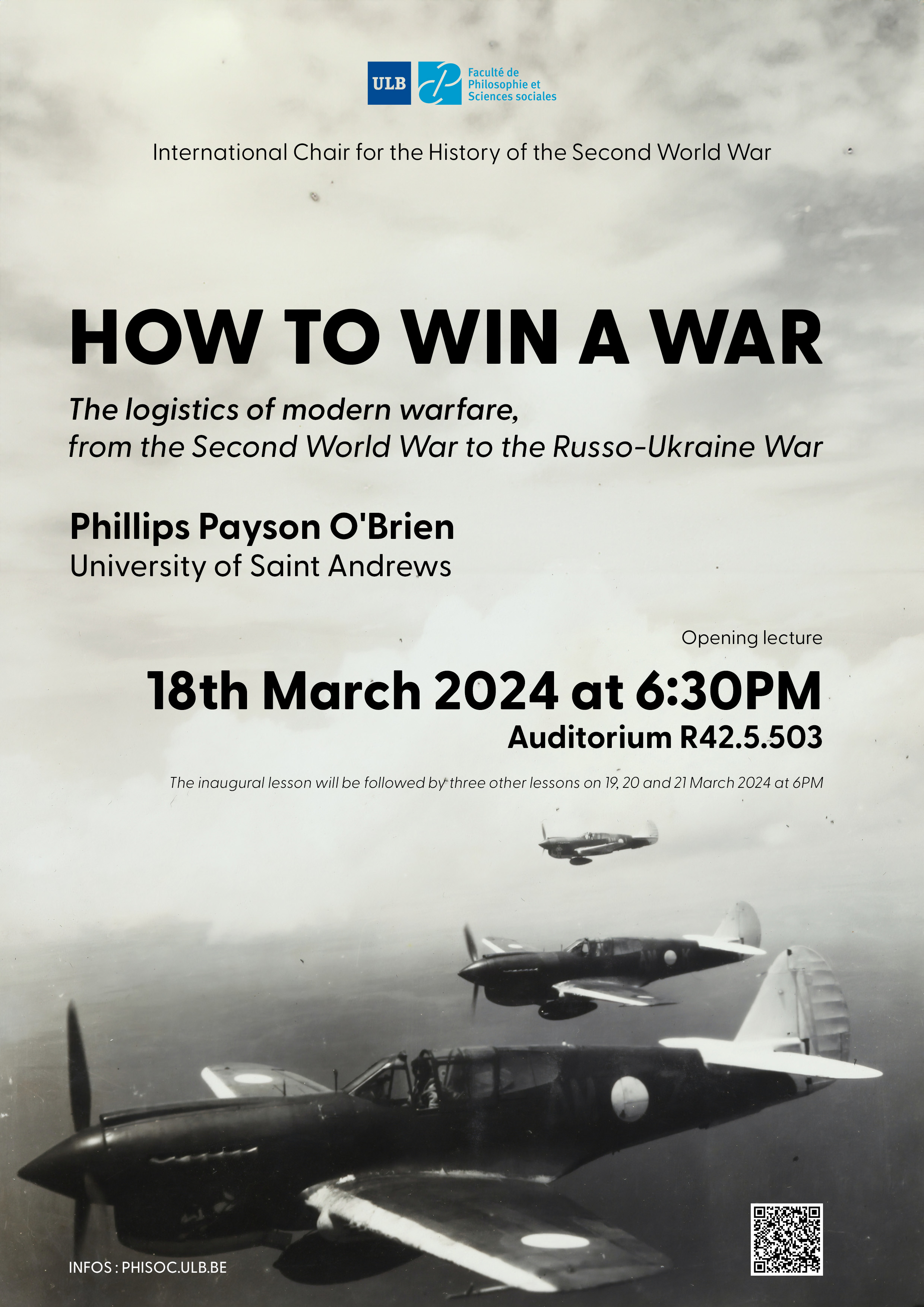-
Partager cette page
International Chair for the History of the Second World War 2024
Leçon inaugurale (en anglais) le lundi 18 mars 2024 à 18h30
Thomas BERNS, Doyen de la Faculté de Philosophie et Sciences sociales,
Marie GORANSSON, vice-Doyenne de la Faculté de Philosophie et Sciences sociales,
Kenneth BERTRAMS, Président du Département d’Histoire, Arts et Archéologie,
Pieter LAGROU, Professeur d’Histoire et responsable académique de la chaire,
Baudouin VELGE, représentant du fonds baron Jean-Charles Velge,
ont l'honneur de vous inviter à la leçon inaugurale de la
CHAIRE INTERNATIONALE D’HISTOIRE DE LA DEUXIÈME GUERRE MONDIALE 2023-2024
International Chair for the History of the Second World War / Internationale Leerstoel voor de Geschiedenis van de Tweede Wereldoorlog
How to win a war
The logistics of modern warfare, from the second World War to the Russo-Ukraine War
Looking back at How the War was Won in light of the Russo-Ukraine War
by Phillips Payson O'Brien
Professor at the University of Saint Andrews
Monday 18 March 2024 at 6:30PM - Auditorium R42.5.503 (DRION)
Lien vidéo de la leçon inaugurale
The inaugural lecture will be followed by the presentation of the Baron VELGE Prize and a reception (R42)
Phillips Payson O'Brien teaches history and international relations at the University of Saint Andrews. In 2015, he published a major monograph with Cambridge University Press How the War Was Won, focusing on the logistical side of modern warfare during WWII. It seemed appropriate for the eleventh edition of the Chair to change the focus for once from the political, social and cultural aspects of warfare to military hardware, especially since Phillips Payson O’Brien has distinguished himself as a sharp analyst and commentator of the current war in Ukraine, among others through a series of articles in The Atlantic. He has done so with caution and with force, showing that historians can add to our understanding of the present and that, while history might not have straightforward lessons to teach to the present, it can offer a source of inspiration and a set of elements of comparison.
The arguments made in How the War was Won: Air-Sea Power and Allied Victory in World War II (Cambridge, 2015) were outside of the norm when it came to the military history of the conflict. In moving away from the focus on battles and generals, to look at production, logistics and attrition, the book made some pointed comments about how the process of defeating Germany and Japan worked. This lecture will re-examine many of those claims, about equipment, complex systems, and mobility, and offer some ways that we might look at them in the present war.
Entrée libre - INSCRIPTION SOUHAITÉE : Formulaire en ligne
The inaugural lesson will be followed by three other lessons :
Tuesday 19 March, 6PM - AZ1.101
Logistics in World War II and the Russo-Ukraine War
Logistics is easily the area of military endeavor that gets the least discussion in times of peace, but then is quickly shown to be vital in war. One issue is that logistics as a concept is not terribly well defined. This lecture will delve into the meaning of logistics systems in World War II and Ukraine, and discuss different ways in which they are determining the outcome of the war.
Lien vidéo de la leçon 2
Wednesday 20 March, 6PM - R42.5.503
Air Power in World War II and the Russo-Ukraine War
This lecture will focus specifically on the question of air power and how it operated in World War II and what we are seeing in Ukraine today. Airpower was the most expensive and complex area of production and engagement between 1939-1945, and influenced everything from the homefront to far behind the battlefield. The indications are that airpower, while the technology is changing, is doing something very similar in Ukraine, and this lecture will explore how that seems to be working.
Lien vidéo de la leçon 3
Thursday 21 March, 6PM - R42.5.503
From World War II, to Ukraine, to the Future of War
What we are seeing in Ukraine today is both quite different technologically from World War II, but with important similarities in process. The growth in UAV technology, for instance, and Artificial Intelligence, has opened up a future of autonomous vehicles defining future combat. On the other hand, certain basic rules on range, accuracy and mass are the same as they have always been. This lecture will speculatively explore what has stayed the same in war since World War II, and what is changing in front of our very eyes.
Lien vidéo de la leçon 4
PLAN ULB - ACCÈS : Campus du SOLBOSCH
INFORMATIONS : phisoc.ulb.be
CONTACT : com.phisoc@ulb.be
Chaire organisée pour la onzième fois par la Faculté de Philosophie et Sciences sociales de l’ULB, grâce à la générosité de feu le Baron Jean-Charles VELGE, décédé le 29 mai 2010, qui tenait à honorer la mémoire de Jean Vanwelkenhuyzen, historien de la Deuxième Guerre Mondiale.

